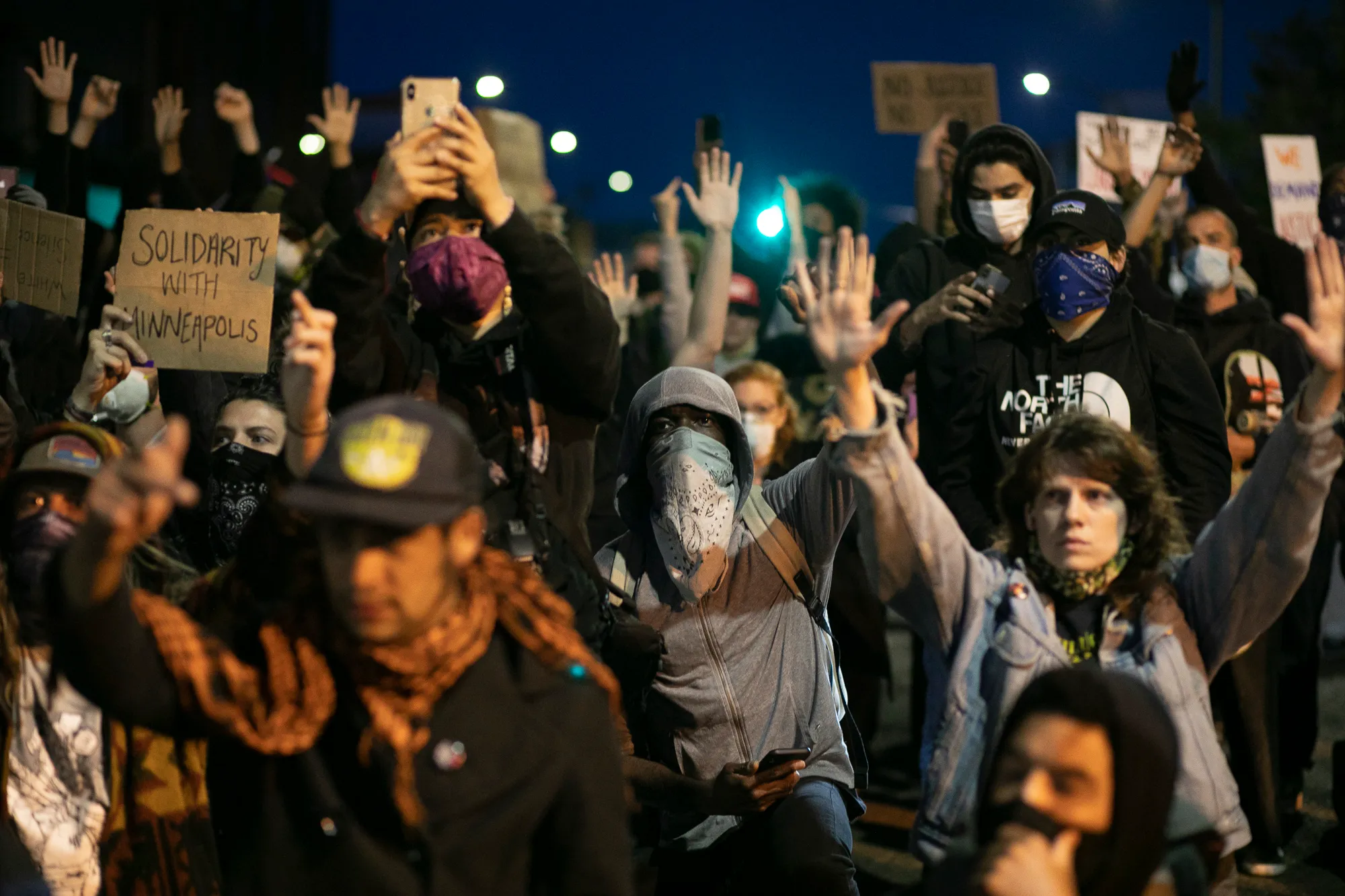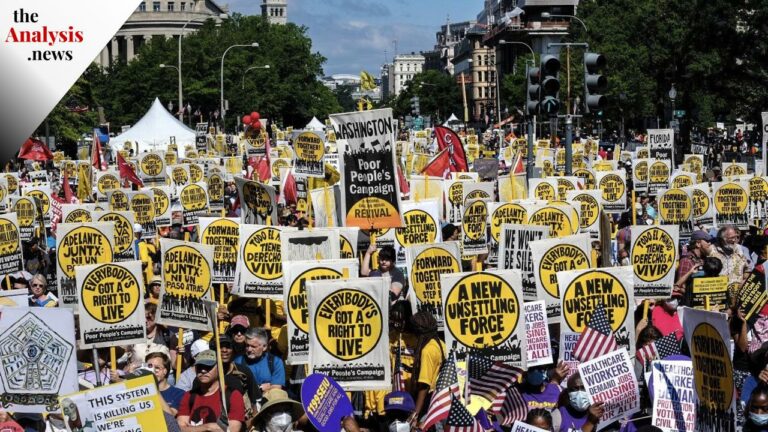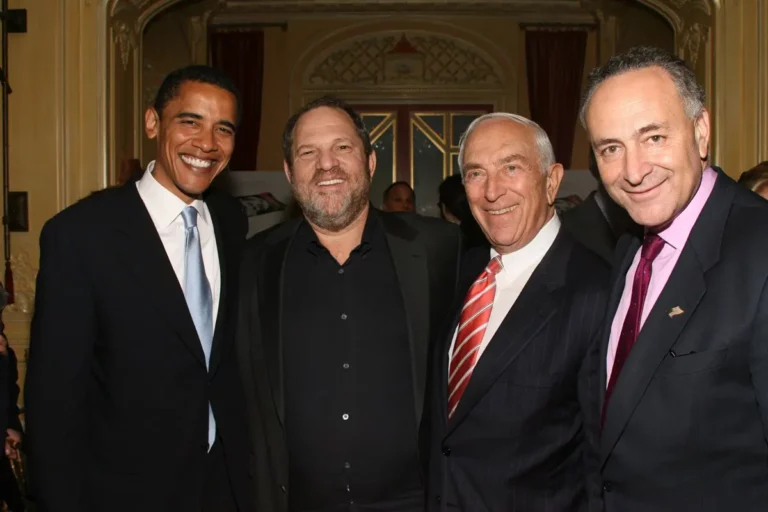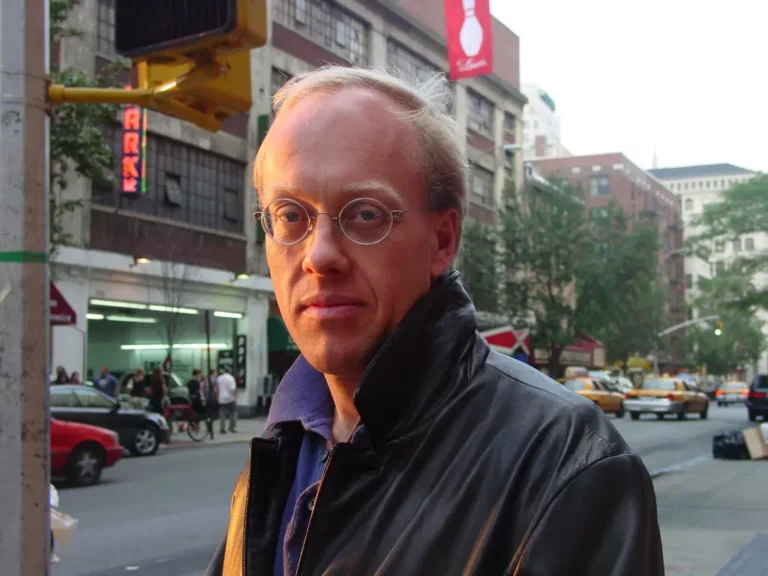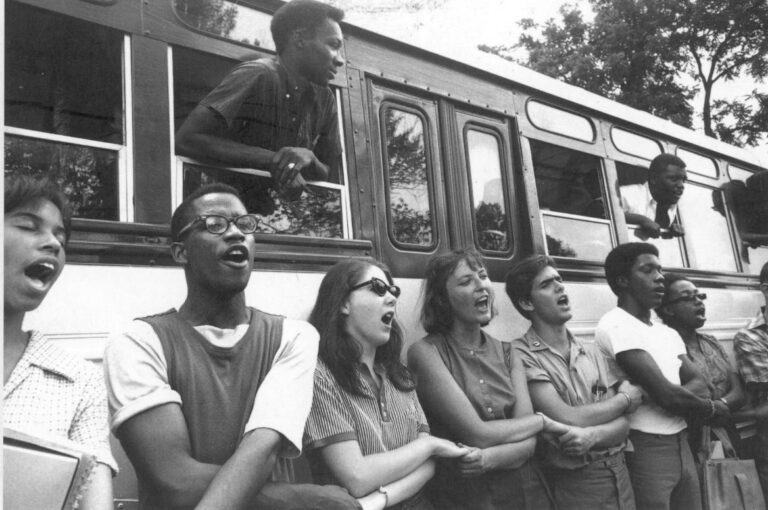The Black Scare and the Democratic Party – Gerald Horne on Reality Asserts Itself (pt 2/6)
This is an episode of Reality Asserts Itself, produced on August 19, 2014. Mr. Horne says the Democrats are heavily dependent upon black votes but afraid of defending their interests out of fear of alienating cross-class racism deeply entrenched in American history.
PAUL JAY, SENIOR EDITOR, TRNN: Welcome back to The Real News Network. This is Reality Asserts Itself. I’m Paul Jay in Baltimore.
We’re going to continue our series of discussions with Gerald Horne, who now joins us again in the studio. Gerald, he’s published over 30 books. He’s the former executive director of the National Conference of Black Lawyers. And he’s written, most recently, The Counter-Revolution of 1776: Slave Resistance and the Origins of the United States of America. And in about one more segment, we’re going to start focusing on that book, but seeing as we started getting into the NAACP and what happened in terms of the concession–concessions that the civil rights movement made and afterwards, we’re going to pick up on that. So let’s kind of jump ahead as a way to talk about the same idea.
You said not long after President Obama was elected that what’s needed is to revive the tradition of radicalism in America. And then someone asked you or you commented on the tradition of liberalism, and you said, well, it wouldn’t be bad if President Obama’s election helped revive the tradition of liberalism. So how’s that working for you?
GERALD HORNE, HISTORIAN AND AUTHOR: The resurgence and the continued growth, spectacular growth of the right-wing in the United States is both frightening and it’s disheartening. As you know, there is a danger that the Republican right will take over the Senate in November, just like they control the House and control the Supreme Court and most of the federal courts. Things are not going very well.
But, fortunately, there’s good news on the international scene, not least the growth of the BRICS–Brazil, Russia, India, China, South Africa. And we know, who studied U.S. history, that oftentimes progressive change has come from external forces, not necessarily from internal forces, for example Jim Crow. I’ve argued and other historians have suggested that the primary pressure not only came from black people marching, but it came from international public opinion, African liberation movements, working-class movements in Europe and in Asia. So I think that the good news, hopefully, will outweigh the bad news.
JAY: I wrote a piece in I guess it was the 2010 elections, just around the time Republicans took back the House. And I gave I think it was ten reasons how President Obama helped revive the Republican Party. And I can’t remember all ten, but, I mean, one of the main ones was not indicting President Bush and Vice President Cheney for war crimes, not at least investigating. Is–his marriage or because he’s so financed by Wall Street and other forces in terms of corporate Democrats, he just would not–I mean, this thing about we don’t want to look backwards, we’re only going to look forwards, all these things of not using that moment of such incredible weakness of the American right to bury them (instead, he engages them; he–you know, it’s all about bipartisanship) and burying the whole Bush presidency and the series of crimes. And also I also thought it was a bit of a distraction in some ways, focusing on the issue of illegal renditions and torture, which of course needed to be talked about. But a war, an illegal war that may have killed a million people, he winds up defending, even though he got elected because supposedly he was against it. So, I mean, it’s not that he didn’t just revive a tradition of liberalism, which I agree could have been–there was a moment there of this kind of liberalism, where within the American elites there is a kind of liberal tradition of sorts, and it’s better than the far right, but he didn’t do that.
HORNE: I think there is a structural problem in U.S. politics which goes back–surprise, surprise–to my 1776 book. That is to say that this two-party system of which we find ourselves ensnared, you have a situation whereby the Democrats were heavily dependent upon black votes. However, I mean, as you well know, in the Deep South, nine out of ten Euro-Americans vote for the Republicans across class lines. It’s an amazing cross-class coalition. I mentioned in the final pages of my 1776 book that in the pivotal and illustrative 1991 election for governor in Louisiana, 55 percent of white Americans voted for a Nazi, David Duke, a Nazi and a Klansman, for governor. So you have the structural problem whereby the Democrats find it difficult to rely upon their base because when they rely upon their base, which is black voters, it leads to the black scare–many white voters find that intimidating across class lines. And so, therefore, what happens is the Democrats oftentimes are forced to attack their base, which is what Bill Clinton did. And you don’t survive very long in politics when you attack the people who elected you. It’s weakening. And I don’t see that as necessarily a personal flaw, although it very well may be, of Obama or Clinton. I see it as a structural problem.
JAY: Yeah, I agree. When I say Obama–it’s very important to say this–I mean his administration, I mean the whole alliance of forces that brought him to power. It’s not just him personally by any means.
HORNE: Right. Right. But having said that, I think particularly with regard to foreign policy Obama has made some significant mistakes. Those too are structural, but in part they’re individual. What I’m pointing to is the invasion of Libya, the bombing of Libya, 2011. And the reason I say that it’s partly personal: in the sense that the leading hawk in his administration, Secretary of Defense Bob Gates, as he says in his memoir, was hostile to the bombing of Libya. So that provided him with cover if he wanted to come out against it.
But it was Secretary of State Hillary Clinton; Samantha Power, now UN ambassador; Susan Rice, now who is the national security adviser, former UN ambassador; who were all gung ho. Now, you could make the argument as well that with regard to U.S. politics, given the strength of the hawks and the right, it’s almost like a gang in Los Angeles, where as a condition of membership you have to shed blood in order to become a full-fledged member of the gang. And to a certain extent that’s true for the U.S. ruling elite, and particularly for the women, not surprisingly–Clinton, Rice, Power–they have to show that they can be sufficiently macho.
And then there’s some trepidation about Obama, since he’s of partial African heritage, that is to say, whether he’ll really carry the flag at the end of the day for U.S. imperialism. And so I think that that pushes him into this disastrous invasion that not only uses tax dollars in a very unwise manner, but now it’s spread like a virus throughout Africa, knock-on effects negatively in neighboring Mali, leading to a UN intervention, a French intervention; knock-on effects in neighboring Niger, which then bleed into Nigeria, China (the largest GDP on the continent; now it’s surpassing South Africa, a major oil producer); now bleeding into Cameroon. Ironically and paradoxically, in a sense this is all the product of the first president of African heritage.
JAY: While most of what I’m heading towards is a critique of the Obama administration, I give him–on the foreign policy side I give him, at least up until today, some credit on the Iran issue.
HORNE: Well, yeah. Bombing has not begun.
JAY: Well, more than that. I mean, he’s engaged and it’s been rational. I mean, I think the sanctions are aggressive, they’re a form of warfare, and so it’s not like he’s been a peacenik towards Iran. On the other hand, it’s all relative. If you had had a Republican presidency right now, whether it was a Romney, or certainly if it had been a McCain, I think the situation with Iran could have been completely out of control by now. So I give him some credit there.
But I want to go back more to the domestic and the politics of it. There was a moment–when you talk about this resurgence of the right and the possibility of the right being able to take back the Senate, never mind the House, I mean, back in ’08 that almost seemed unimaginable. After that, the Bush presidency was such a disaster. Now, mind you, it was still a close election, given what a disaster that presidency was. But once you have the bully pulpit and the power of the presidency in that first year and you control both houses, he could have buried them. But it seems to me, in terms of his own understanding of that class interest, they didn’t want a civil war within the elites, they didn’t want to bury the Republicans, they being his own backers, even for pure political partisanship. I mean, the Republicans never would have felt that way. If things had been reversed and they could have buried the Democratic Party, they would have done it. And, I mean, they go after Clinton for–I guess I can’t completely say the words I want to use, but, you know, for the Lewinsky thing. But this rise of the strengthening and reorganization and revival of Republican Party you’ve got to put on the Obama administration.
HORNE: Well, in part. I mean, certainly there is a very severe case of amnesia that’s part of the U.S. national psyche. People don’t necessarily recall, believe it or not, 2006, 2007, the latter days of the Bush administration.
But there’s the more profound, I reiterate, structural problem. I mean, think about it for a second, something that we may take for granted. Throughout the United States, littering the landscape, are memorials to Confederate war heroes, including in the college town where I maintained a temporary residence from time to time, Chapel Hill, North Carolina. The centerpiece of that campus is a huge statue to a Confederate war soldier. You go to Richmond, Virginia, right down I-95, 30 foot statues to Stonewall Jackson, Robert E. Lee, etc. Now, in what country do you build memorials to traitors who tried to overthrow the government?
I think that the lesson we should infer is that there is a powerful right-wing force in the United States of America that stretches all the way back to 1776, when–I argue that the republic was founded on principles of freedom to enslave Africans and that that particular virus has yet to be exterminated. And you see it in the voting rolls. I mentioned the 1991 race for governor of Louisiana. We could cite chapter and verse till the cows come home about such similar elections.
And even though an Obama can win the 2012 election, he loses the white vote six to four. And votes are not just counted; they’re weighed. And when you begin to weigh votes, when you begin to see that those who were defined as white occupy the highest reaches of not only the middle class but the ruling elite, and even the trade union movement, well, then you begin to understand the correlation of forces which would force any president, even a person as intelligent and as progressive as Paul Jay, into a similar situation.
JAY: Well, here’s what I would’ve done, but I never in a million years would ever have been elected in the first place, so I never would’ve been able to do it. But you’re talking about people who vote. Well, what, 40 percent of people don’t vote, and the vast majority of them are probably white, especially in the Obama elections, because a lot of poor blacks that normally don’t vote did vote because Obama excited them for obvious reasons.
But that 40 percent that don’t vote, if you look at opinion polls on issues that are not polls of voters, just polls of the people, the vast majority of the country actually takes fairly progressive positions on almost everything. In fact, assuming you think being opposed to capital punishment is progressive, I think that’s the only issue where the majority are actually for capital punishment when you take the whole population. But on every other issue, like preemptive war to should rich pay higher taxes, to should there be a strong social safety net, so on and so on and so on, the majority of people are fairly progressive in their position. But 40 percent don’t vote. So it seems to me if you really want to defeat the right–and I mean if you’re president and you have this kind of administration–you’d do everything possible to register and get excited and do stuff, most importantly, actually do somethingfor that 40 percent, ’cause most of them are poor, and excite them to vote. But again I go back to this: because of the class interest, President Obama and his administration, either they don’t understand that or they don’t want to open up that Pandora’s box, ’cause if you actually get that 40 percent engaged in politics, I would say all the elites are kind of afraid where that might lead to.
HORNE: Well, sure. It’s just like in the trade union movement, which I have some experience with. It’s a similar sort of problem. On the one hand, if you look objectively at the trade union movement, you can see which route they need to go for revival. But oftentimes you find the leaders are rather nervous and apprehensive about awakening the rank and file, because they may be awakened to challenge corrupt deals and corrupt bargains and plush sinecures that leaders have. And I think that what happens to the trade union movement is akin to what happens in political parties like the Democratic Party.
But then I think there are miscalculations, too, by many of our friends on the left. I recall not so long ago that our friends on the left were telling us that we need to move away from race-conscious remedies like affirmative action, which particularly appeal to black Americans, although the major beneficiary are women of various ancestries and ethnicities, and we need to focus on universal approaches, remedies, like health care, for example. Fine. The U.S. administration focused on health care. And now you would think that something worse than Satan returning to Planet Earth has taken place as a result.
I think we also have to look at the intensity of voters and the intensity of certain classes, the intensity of feeling. I mean, for example, if you look at a question like abortion, for example, you’ll find perhaps majorities are in favor of a woman’s right to choose. But if you look at the intensity of those who get involved in that issue, oftentimes it’s the antichoice movement that has the flame of intensity. And at the end of the day, the flame of intensity is oftentimes what wins the day.
JAY: I guess the point I was making was that if you look at the structural issue–and I take your argument, ’cause in the end it still is about who votes and who doesn’t vote–that there really is a very powerful right. I mean, just look at that ’08 election. In spite of how terrible the Bush presidency was, it’s still, what, just a matter of a few points between Obama and McCain. And I think perhaps sometimes I personally maybe underestimate just how powerful that force is. But the point I was making is that if you actually want to defeat that, it’s actually a minority in the country if you think of the 40 percent who don’t vote. But the Democratic Party, and the unions themselves on the whole, they do a little bit about registration, but, like, for example, the Democrats let ACORN get smashed, and ACORN was this organization that focused a lot on registering poor people. And I don’t know after ACORN got torpedoed–you know, there’s still some registration efforts, but not a massive campaign. And it’s that this administration, like much of the hierarchy of the unions, much like much of the hierarchy of what’s now the inheritors of the civil rights movement, they don’t want this kind of transformative change. They’re as afraid of this 40 or 50 percent of poor people as the elites are.
HORNE: To a degree that’s true. But, also, if you look at the structure of the two major parties, in the Democratic Party you have this uneasy coalition between base voters, who oftentimes are working-class, oftentimes black and brown, and they’re in an uneasy alliance with capital that oftentimes is heavily invested that doesn’t necessarily employ that much labor, like Wall Street, for example. That’s the Democrats. And then on the Republican side you have a lot of white working-class voters, middle-class voters, and then you have employers who employ lots of labor. And that’s been the case for decades now. And if you think about it for more than a nanosecond, given that correlation of forces in both major parties, it gives you an idea why progress is so difficult, because obviously what you need is for the base voters of the Democrats, working-class people, to ally with the base voters of the Republicans, who oftentimes are working-class people, but there is a black scare, there is a racial divide that oftentimes prevents and obviates that kind of an alliance.
JAY: And we get back to the past weighing like a nightmare on the brains of the living. And so we’re going to pick up this and really start going through your book, the 1776 book, in the next segment of our interview on Reality Asserts Itself on The Real News Network.
“Gerald Horne is an American historian who holds the John J. and Rebecca Moores Chair of History and African American Studies at the University of Houston.”
